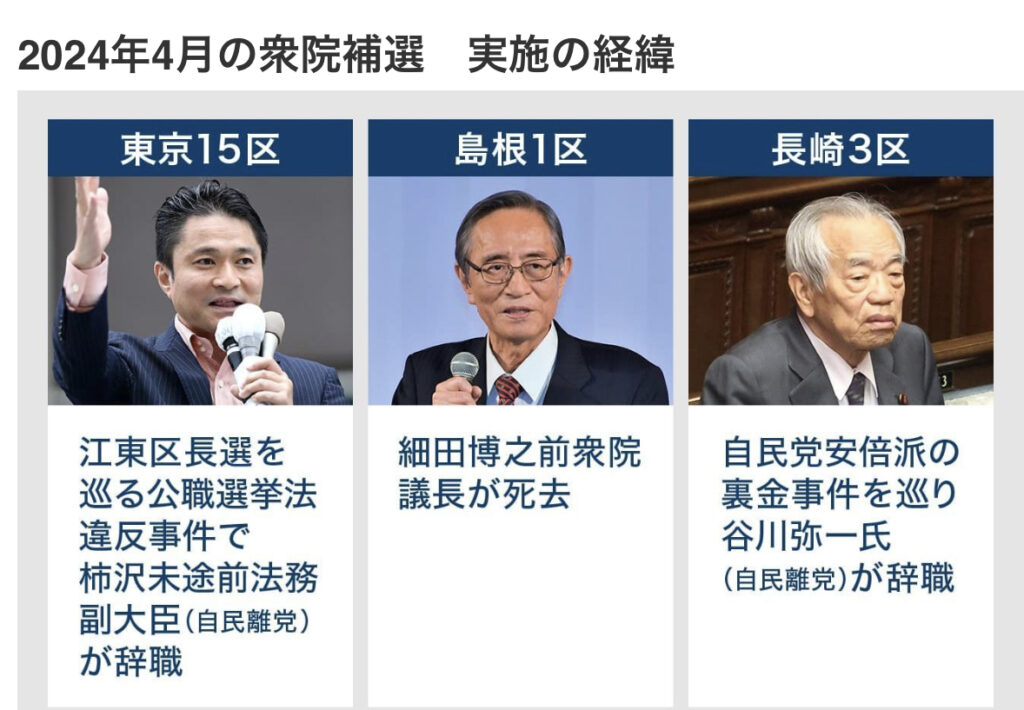
「補選全敗」政権の戦略に狂い
✍️記事要約
衆議院の3つの補欠選挙が全敗に終わったことで岸田首相の政権運営はさらに厳しさを増し、今の国会中の衆議院の解散・総選挙は難しくなったとみられている。一方で自民党内ではすぐには「岸田おろし」は起きないとの声が強い。なぜなのか?“補選全敗”の岸田政権への影響を分析・解説する。
28日に投開票が行われた衆議院の3つの補欠選挙は2つの不戦敗を含め自民党の3敗・全敗に終わった。
保守王国で自民党の牙城として知られる島根でも党の公認候補が敗れたことで岸田首相の政権運営はますます厳しさを増し、自民党内からは「今の国会中の衆議院の解散・総選挙は相当難しくなった」といった声や「岸田首相がトップのままでは衆議院選挙はとても戦えない」との声が上がっている。
特に選挙戦最終日の27日土曜日に岸田首相が周囲に慎重な意見があるのを押し切る形で島根に二度目の応援に入りながら敗れたことは、今後、首相の求心力低下につながる可能性もありそうだ。
さらに、岸田首相と距離があるいわゆる非主流派の議員からは「岸田おろしの動きが始まる」、「政局含みの展開になる」との声も上がっている。
ただ、自民党内ではすぐには「岸田おろし」の動きは起こらないだろうとみている党幹部や議員が多い。なぜなのか?
理由として大きく4つ挙げられる。
1:選挙期間中から劣勢が伝えられ全敗は既に織り込み済みだったから
2:自民党全体の責任で党内でガタガタしている余裕すらないから
3:大型連休に入り岸田首相がフランス・ブラジルなどを訪問し、野党が国会などで追及することがないから
4:非主流派側も「岸田おろし」の主戦場は今ではなく9月までにある自民党総裁選だと判断しているから
とは言え、この苦境を岸田首相はどうやって打開していくのか。
首相の側近議員や政権幹部らが必要だと指摘しているのが、「補選敗北の責任を明確にし局面を打開するための党役員人事」というものだ。
複数の自民党議員が「補選全敗したのに幹事長が責任を取らないのはあり得ない」と指摘していて、具体的には茂木幹事長の責任問題が浮上すると言われている。
一方、立憲民主党は補選3戦全勝の勢いに乗って岸田政権への攻勢を強め、岸田首相のままで早期の解散総選挙に追い込みたい考えだ。
こうした中、後半国会の最大のポイントとなっているのが、自民党の裏金事件を受けて議論されている政治資金規正法の改正を実現できるかという点だ。
岸田首相の側近議員は「政治資金規正法改正に向けた首相の決意は相当固い」と語っているが、立憲民主党を中心とした野党が補選の勝利で強気に出てくる中、自民党主導で法改正を実現できるかは予断を許さない状況となっている。
6月23日の会期末前には野党側が内閣不信任案を出すことも考えられる。
ある自民党幹部は「終盤国会は政治資金規正法の成立と引き換えにした内閣退陣や、不信任案が引き金となっての解散・総選挙すらありうる」との見方を示しており、緊迫した展開も予想される。
■英訳
The three by-election losses in the House of Representatives have further complicated Prime Minister Kishida's administration, making it increasingly difficult for a dissolution of the lower house and a general election during the current session of the Diet. However, within the Liberal Democratic Party (LDP), there's a strong sentiment that a "Kishida ousting" won't happen immediately. Why is that? Let's analyze and explain the impact of the "complete by-election defeat" on the Kishida administration.
The by-elections held on the 28th resulted in three losses for the LDP, including two uncontested defeats, highlighting the challenging environment even in Shimane, known as a conservative stronghold for the party.
Prime Minister Kishida's decision to personally campaign in Shimane on the final day of the election, despite cautionary advice from his inner circle, suggests a potential decline in his leadership's authority in the future.
Additionally, voices from so-called non-mainstream factions within the LDP suggest that movements to oust Kishida may begin, leading to a potentially volatile political situation.
However, many party officials and lawmakers within the LDP believe that movements to oust Kishida won't occur immediately, for several reasons:
1. The party had already factored in the by-election losses due to reported disadvantages during the campaign period.
2. There's no room for internal turmoil within the LDP as a whole.
3. With the start of a long holiday period and Kishida's planned visits to France and Brazil, there will be minimal opposition scrutiny in the Diet.
4. The non-mainstream factions perceive the main battleground for ousting Kishida to be the LDP leadership election in September, rather than immediately.
Nevertheless, how will Prime Minister Kishida navigate this difficult situation?
Close aides and administration officials point out the necessity of "clearly assigning responsibility for the by-election defeats and reshuffling party officials to overcome the situation."
Several LDP members argue that "it's unacceptable for the secretary-general not to take responsibility for the complete by-election defeats," and there are suggestions that Secretary-General Motegi's accountability may come under scrutiny.
On the other hand, the Constitutional Democratic Party of Japan (CDP) is capitalizing on its victory in all three by-elections to intensify its offensive against the Kishida administration, hoping to force an early dissolution and general election while Kishida remains in power.
Amidst these developments, a crucial point in the latter half of the Diet session is the discussion on amending the Political Funds Control Law, prompted by the LDP's slush fund scandal.
While close aides to Prime Minister Kishida assert his strong determination to amend the Political Funds Control Law, the opposition, led by the CDP, is emboldened by its by-election victories, raising doubts about the LDP's ability to push through legislative reforms.
There's even speculation that the opposition might submit a motion of no confidence before the end of the session on June 23rd.
One LDP official suggests that "the endgame of the Diet session could involve a cabinet resignation in exchange for the passage of the Political Funds Control Law or even trigger a dissolution and general election," indicating a potentially tense situation ahead.
◇ ◇ ◇
☘️ヤフコメ❗️ピックアップ☘️
これまで「政治とカネ」の問題ですら、総裁である岸田首相は、自らの責任を回避した。
この補欠選挙の3連敗で、幹事長の茂木氏、選対委員長の小渕氏に責任を取らせるというのであれば、党内の批判から岸田首相は免れないところがある。
また、ここで責任を取らされては、茂木氏は秋の総裁選への出馬に「黄信号」がともる可能性もある。
「岸田おろし」は確かにすぐに起きるというものではないかもしれない。というのも明確な誰もが認める求心力のある「ポスト岸田」が、存在しない中では、「岸田おろし」を行ったとして「誰が総裁になるか」が不明である。
このまま首相の外遊を経て、通常国会終盤まで岸田氏が政権を担当し続ける可能性もある。
しかし、それではこの選挙の「責任論」から、岸田首相が逃れるとの印象を、再び有権者に与えることとなる。それは自民党にとっては好ましくないといえる。
✅ 予想されたとおり、「補選3敗」。いや、当然の結果ということだろう。今回の「政治とカネ」の問題は、自民党の問題を超えて、政治全体の問題になっている。だが、その問題の端緒は自民党から起きたものだ。その自民党が、この問題に適切に対応せず、その問題性を深めているのだから、この結果は起こるべくして起きた当然の結果だ。この問題の核心に迫り、問題解決に向けて、単なる言葉を超えて具体的に対応・行動すべき中心人物であるべき総理・総裁の岸田氏の責任は特に重い。他方、「ポスト岸田」が明確でない今の政界において、同氏はその対応への責務の自覚が乏しい。しかし、この選挙の結果、自民党および議員はかなり追い詰められ、苦境を切実に感じているはずだ。政治における新たなる変化や動き、そして混迷が確実に起きるだろう。いや少なくともそう期待したいし、そうならなけれ政治の現状への失望と不信はさらに深まることになる。
✅ まずは政治資金規正法の改正です。これをやり遂げずに解散総選挙はあり得ず、むしろ規正法の改正までは岸田総理の責任のもとで行うべきでしょう。
一方、規正法改正の自民党案は「ぬるい」との声が上がっており、与野党協議は難航するでしょう。規正法改正に時間がかかるようであれば、やはりその間に「岸田おろし」は起きないとの見方は確かにあります。
一方で、この補選の責任を幹事長や選対委員長が取るでしょうか。確かに党務の責任者ではあるものの、首相自ら2度選挙区に入るなどのテコ入れもありました。党務としての責任と総裁としての責任、どちらが切り出すのかが注目です。
いずれにせよ若手中堅にもショックな内容で、最近流れた週刊誌報道による議席予測と併せて「今のままでは戦えない」というムードが広がります。総裁選までは解散総選挙は難しいとの見方が一気に広がるでしょう。
![]()
